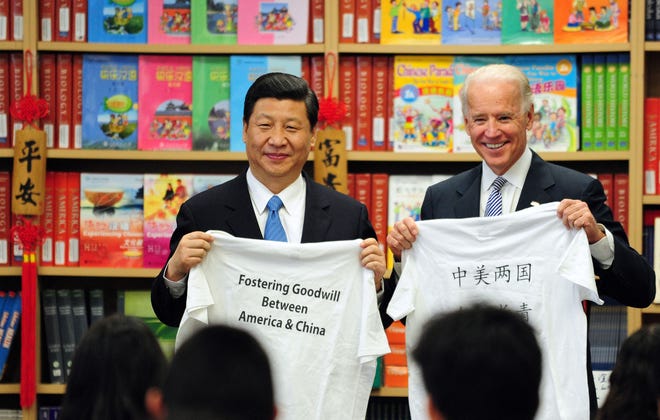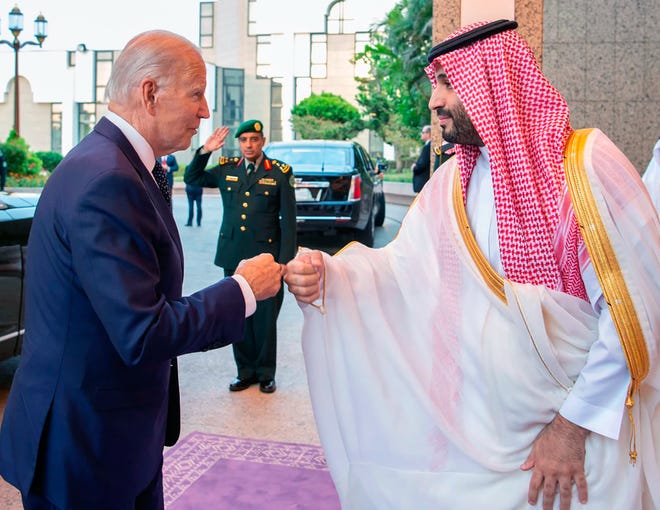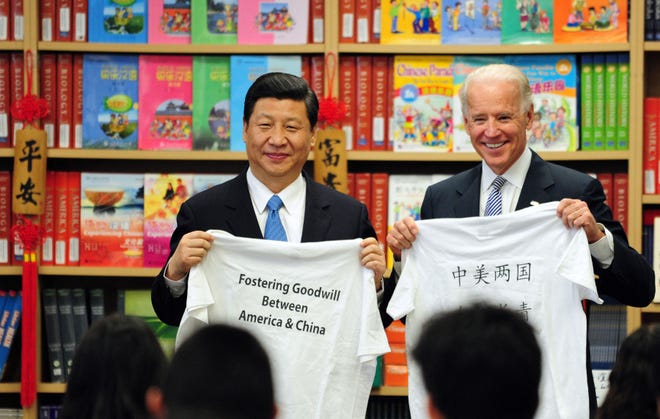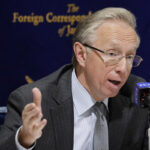WASHINGTON – President Joe Biden will go from battling Republicans at home to sparring with foreign rivals as he embarks on a weeklong trip to Asia.
Biden is bracing for a face-to-face meeting with newly elevated Chinese President Xi Jinping at the annual Group of 20 Summit, which is being held this year in Bali, Indonesia.
He’s also expected to have uncomfortable conversations with a raft of nations that have remained neutral in Russia’s invasion of Ukraine. The multiday affair will be the first time the world’s top economies, collectively known as the G-20, have come together since Russian President Vladimir Putin launched his blistering military assault.

Biden notched an early diplomatic victory when Russia announced plans for Putin to skip the summit. Western leaders and Japan have declared Putin persona non grata – and Biden said he had little motivation to speak to Putin at the conference.
The conversations will be “less awkward” than when Putin was expected to attend, said Kelly Ann Shaw, a former G-20 lead negotiator and deputy director of the National Economic Council in the Trump administration. But “there’s still going to be some inherent tension.”
Putin’s presence had threatened to derail the gathering, which is typically characterized by working lunches and group dinners, enthusiastic handshaking, reciprocal backslapping and family photos. Participating nations also release joint statements at the summit’s conclusion that are often light on specifics but promise cooperation on areas of shared concern.
“You’re going to have some potentially more frank conversations among leaders, where they’re talking about what to do about the energy crisis, what to do about food shortages, fertilizer shortages, how to address the war in Ukraine,” Shaw said. “And you don’t have the tension of Putin physically being there in the room and getting into an argument over it.”
Crisis talks:Biden to meet with China’s Xi amid increasing tensions over trade, Taiwan
Xi’s Rise:Xi Jinping to remain ‘chairman of everything’ in China after being presented a third term
Top competitor:Biden lays out national security strategy while re-evaluating Saudi relations
The strain in U.S. relations with Saudi Arabia, a major oil producer that worked with OPEC nations last month to drastically cut production, and hostility between some nations and China are also complicating factors.
“Usually when these leaders see each other, no matter what geopolitical tensions are happening, there’s some sort of feeling of shared leadership, shared responsibility in that room,” said Josh Lipsky, a former White House aide to Barack Obama and senior director of the Atlantic Council’s GeoEconomics Center.
“All of the interactions – I don’t think there’ll be any fist bumps – are going to be sort of the basic diplomatic requirements and nothing more.”
Biden came under heavy criticism for fist-bumping Saudi crown prince Mohammed bin Salman – the kingdom’s de facto leader – on a July trip to Jeddah, where the U.S. president failed to secure a substantial increase in output from the oil cartel.
He had vowed before taking office to make the crown prince a “pariah” for ordering the death of American journalist Jamal Khashoggi in October 2018.

Since the production cut, Biden has said the U.S. is reviewing its relationship with Saudi Arabia and promised “consequences” amid backlash to the supply cut from lawmakers on Capitol Hill.
Sen. Chris Murphy, chairman of the U.S. Senate Foreign Relations Subcommittee on Near East, South Asia, Central Asia and Counterterrorism, has pushed for a major recalibration of relations and a smaller U.S. military footprint in Saudi Arabia but said in an interview that he would not take issue with Biden having a conversation with bin Salman at the summit.
“I think the president should meet with our friends and adversaries, with some exceptions,” said Murphy, D-Conn. “I want the president to be talking to whoever he thinks it’s useful to talk to.”
‘A good day for America’:Biden hails midterms even as key races, control of Congress remain undecided
‘Not a repudiation’:Joe Biden holds off red wave, gets unexpected boost from midterm election
Clash of world powers
The only head of state the U.S. has terse relations with that Biden is angling to meet is Xi.
Biden has been pushing for months for an in-person discussion about Russia’s war on Ukraine, and China’s aggravated relationship with Taiwan. He also plans to speak to Xi about global climate-fighting efforts.
“What I want to do with him, when we talk, is lay out…what each of our red lines are,” Biden said at a Wednesday news conference. “Understand what he believes to be in the critical national interests of China, what I know to be in the critical interests of the United States, and determine whether or not they conflict with one another. And if they do, how to resolve it and how to work it out.”
In the meantime, the administration has been ratcheting up its efforts to keep China from expanding its burgeoning computer chip manufacturing industry. The U.S. considers competition with China to be one of its foremost national security challenges.
Since securing a norm-defying third term at the Chinese Communist Party congress last month, Xi has tightened his grip on power and intensified his own diplomatic efforts.
He has hosted the leaders of Germany, Vietnam, Tanzania and Pakistan in recent weeks and plans to attend the Asia-Pacific Economic Cooperation summit in Thailand when the G-20 ends. Xi also reportedly has plans to visit Saudi Arabia before the end of the year.
Biden is unlikely to wrangle any firm commitments out of Xi, but sitting down with him is constructive, said Gerard DiPippo, a senior fellow with the Economics Program at the Center for Strategic and International Studies.
“No one really wants to talk about engagement anymore, because it’s a dirty word. But I think there’s a recognition amongst Asia policy people that we need to be talking,” DiPippo said.
Latest Ukraine updates:100,000 Russians killed, wounded in Ukraine; 90% of Ukrainians see bright future for country
Midterm elections:How did candidates who questioned, denied 2020 outcome fare in Tuesday’s elections?
War in Ukraine a top issue
Even among historical allies, the summit may not be an entirely rosy affair.
Biden must reassure nations that Ukrainian aid is not on the chopping block despite domestic concerns about inflation and pressure to cut spending from some Republicans.
“That’s an important message to deliver. But then he has to come home and follow through on that, potentially with a divided caucus, which is not going to be easy to do,” Lipsky said.
The president is also likely to face questions in light of his party’s performance in the midterms about the $11 billion in international climate financing he pledged the U.S. would spend annually by 2024. The money that would help lower-income countries fight climate change would require an appropriation by Congress.
Biden plans to visit the Egyptian resort town of Sharm el-Sheikh just long enough to meet with the Middle Eastern nation’s president, Abdel Fattah el-Sisi, and deliver a climate change address. He’ll immediately jet off to a gathering of southeast Asian nations in Cambodia, where he will try to persuade participating countries to reject economic partnerships with China and accept investment from private companies that are based in the U.S.
Although his focus in Bali will be on Xi, Biden also plans to meet with Indonesian President Joko Widodo. European nations and the U.S. are in the final stages of developing a plan to further choke off Putin’s resources by imposing a price cap on Russian gas and oil.
Biden’s administration has pushed hard for the compact but has run into issues with nations such as India and Indonesia that are considering whether to get involved.
“I certainly think there’ll be a full court press effort to try to get them to take action,” Shaw said, “to resolve the conflict as soon as possible.”




